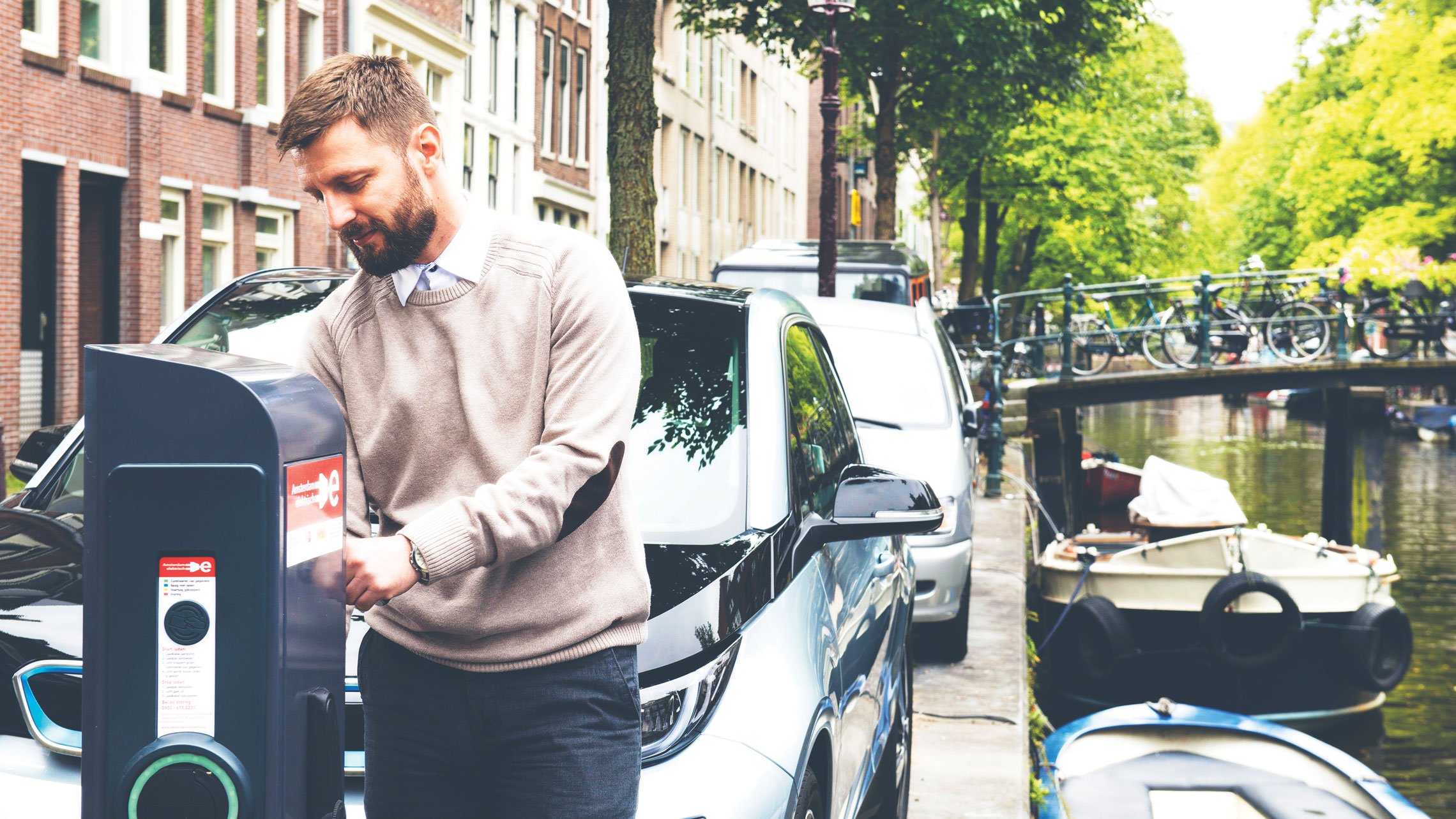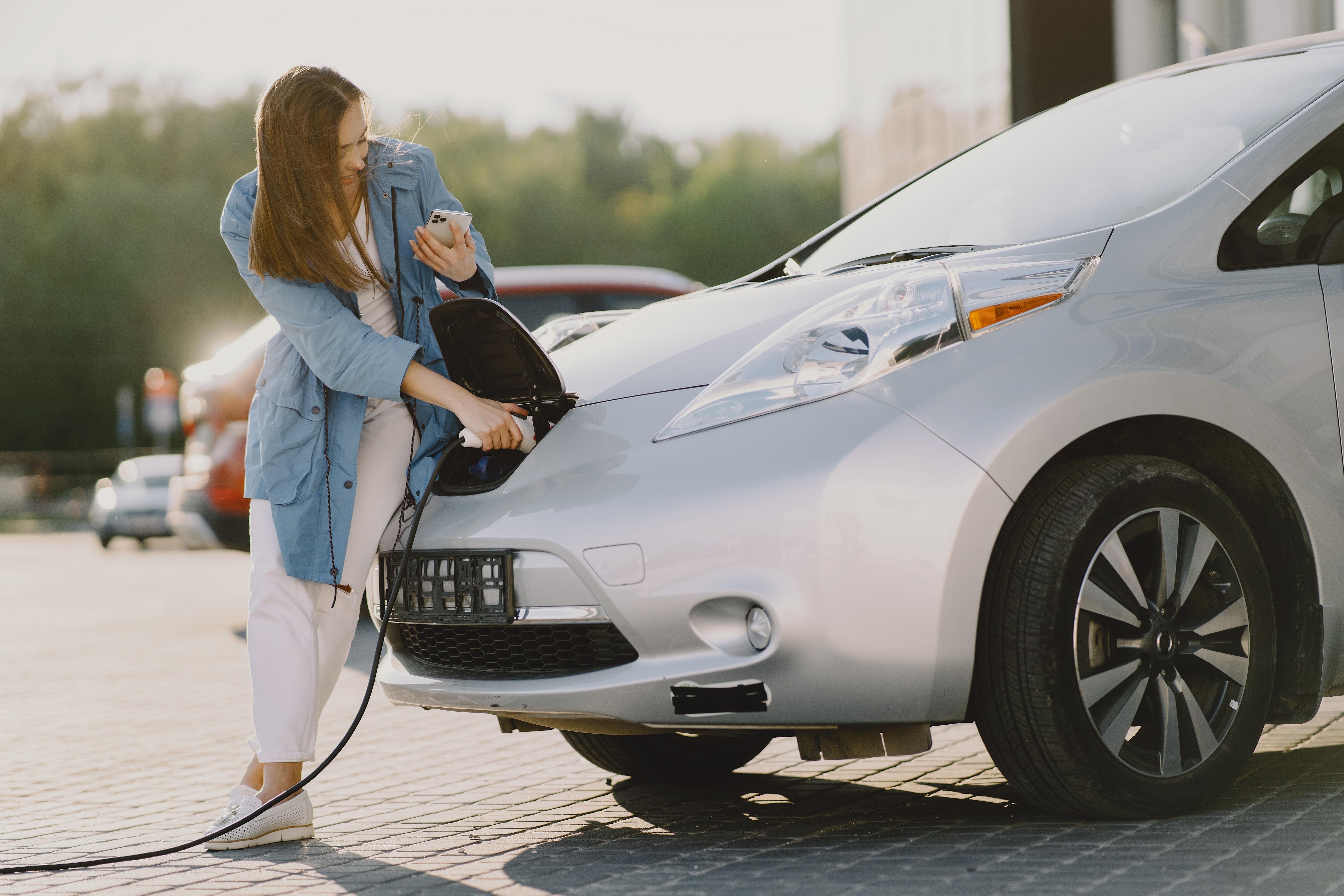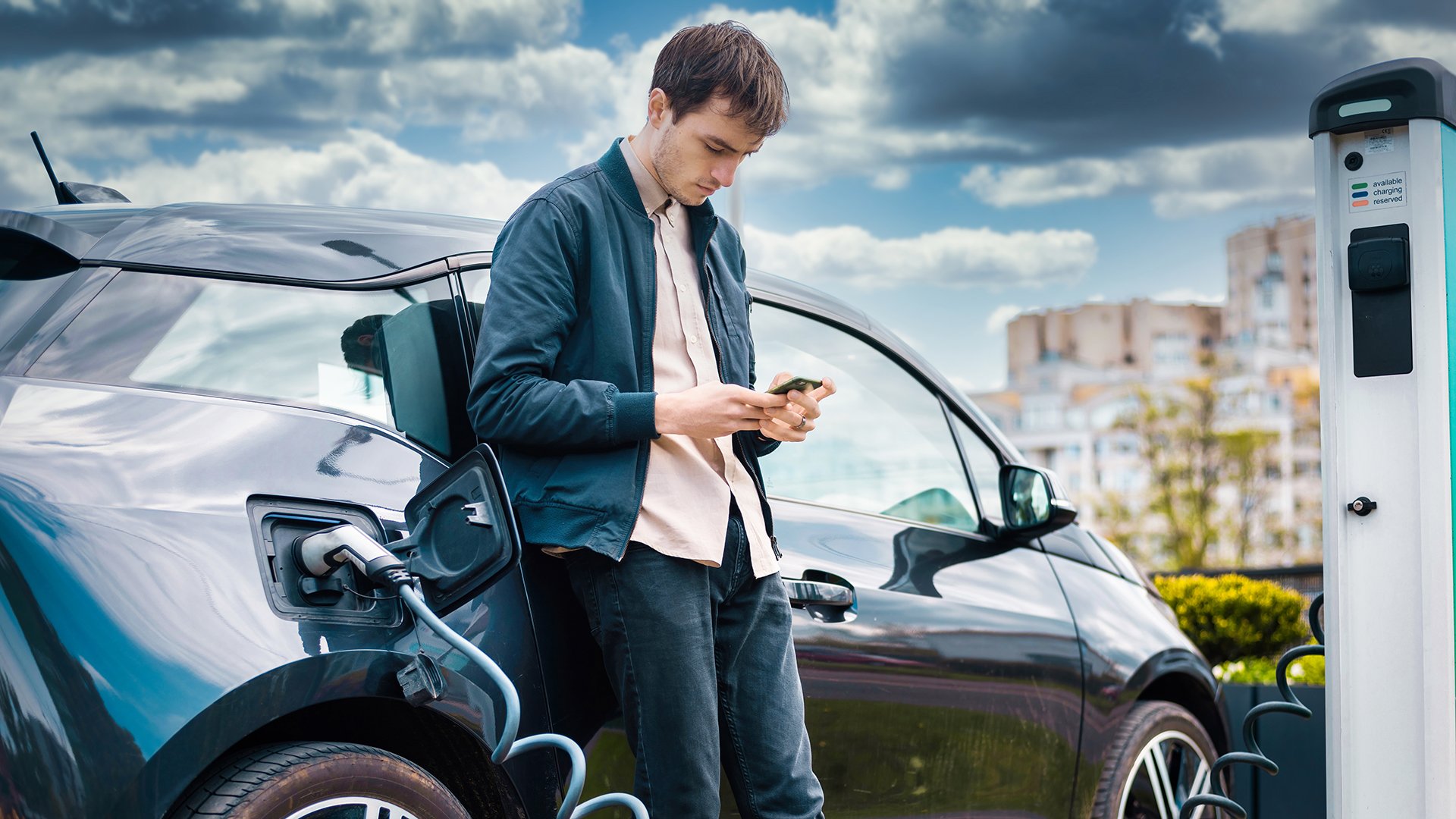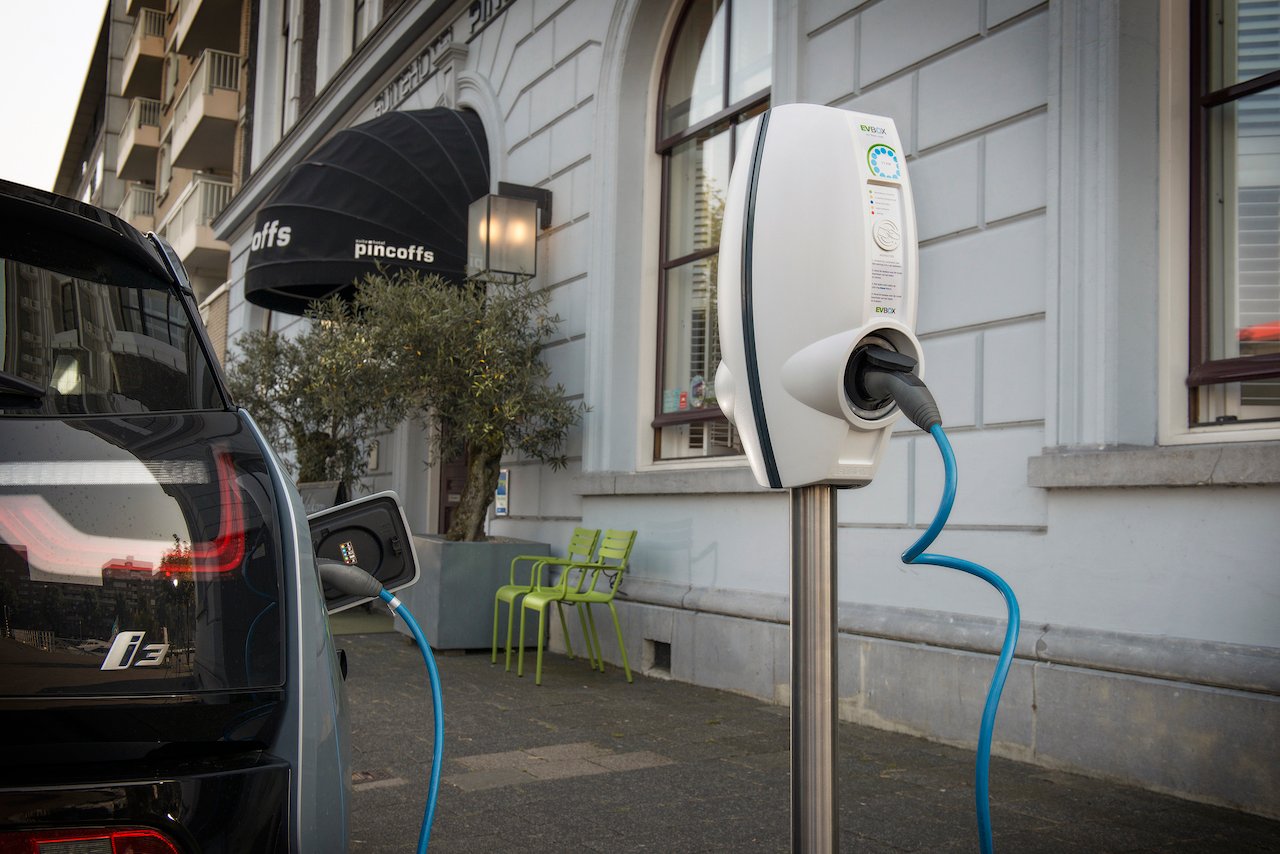How Long Does It Take To Recharge An Electric Car
Back to manufactures
Infrastructure
How long does information technology take to charge an electrical car?
October 20, 2021 |
Electrical mobility is on the rise—and then much then the electric vehicle (EV) market place is forecast to be worth $ane.9 trillion by 2028. With EV prices declining, and a larger model variety than ever before, over 45 percentage of people are now because an EV for their adjacent car. While there has never been a meliorate time to bulldoze electric, with then many models to cull from, and new terminology to get your caput around, making the switch tin can be daunting. Plus, if you've never driven electrical before, you lot probably have a lot of questions, i beingness: How long does it accept to charge an electric car? Unfortunately, at that place's no simple answer to this question, simply knowing the variables can brand it easier to figure out. Let's take a look at what factors influence charging fourth dimension to guide you lot towards a reliable estimate based on your situation. Before we dive in, it's important to understand how the EV-driving mindset differs from driving a gas-powered vehicle. Typically, gas vehicle drivers make full their tanks whenever the fuel approximate reads empty. When information technology comes to EVs, instead of letting the battery drain empty before recharging, most EV drivers top upwards whenever they park. Whether that's at home overnight, at work, or at the supermarket, with a charging station on mitt, all that valuable parking time can be used to keep the battery topped up and gear up to get. And then, while charging an EV does take longer than filling up with gas in some cases, you probably won't notice while you lot're off doing more important things. Like to the fuel approximate on a car, country of charge (SoC) refers to how much energy your EV can use between 'full' and 'empty.' Similar mobile phones and laptops, EVs use lithium-ion batteries which degrade faster when drained to zilch and then fully charged. That sounds more scary than it actually is, as EV batteries are designed to last for the long term. To counter this, auto manufacturers put systems in place to prevent batteries draining below or charging above certain limits—typically in a higher place lxxx pct and beneath xx percent. This means charging from fourscore to 100 percent could take as long or longer than the initial charge. Environmental atmospheric condition play a vital function in how fast you tin charge an EV. Batteries operate almost efficiently when temperatures are between xx–25°C (68-77°F). If temperatures get too depression or also high, it may take slightly longer to charge, particularly if using a Level three charging station. This is because a vehicle'due south battery management system (BMS) reduces ability to protect the battery when faced with higher or lower temperatures. Aside from the above, one of the primal things influencing charging time is the capacity of your charging station. In that location are different levels of charging, and mostly speaking, the higher the level, the faster it can charge your vehicle. Allow'due south take a look at each to encounter how they compare. Level 1 charging refers to plugging the cablevision that came with your EV into a standard household socket. Charging via a domestic socket is the slowest way to charge an EV. Standard household outlets deliver upward to 2.3 kW (10 A). This equates to around four to 5 miles of range per hr (6 to eight kilometers). So, for example, if yous're looking to fully charge a 50 kW Peugeot e-208 on a Level 1 charger, information technology would have 24 hours and xxx minutes. This method is not just ho-hum, but under certain circumstances, it can exist unsafe. Learn why we don't recommend this charging method. Level ii charging refers to charging your EV via a charging station either mounted on the wall, a pole, or standing on the footing. Given their price point and charging speed, Level 2 chargers are commonly found at residential and commercial locations. Depending on the power output and the vehicle type, charging on a Level 2 charging station is roughly v to 15 times faster than charging via a regular socket. Level ii chargers come in a range of charging capacities. Charging for an hour with a 7.4 kW charger delivers almost 25 miles (forty kilometers) of range, an 11 kW charger nearly 37 miles (lx kilometers) of range, and a 22kW charger around 75 miles (120 kilometers) of range. These calculations are estimates based on the average battery utilize of 18kWh per 62 miles (100 kilometers). To put this into perspective, to fully charge a 50 kW Peugeot e-208 on an eleven kW Level 2 charging station would have only 5 hours and 15 minutes—significantly faster than the Level one example in a higher place. Too known equally DC fast charging, Level 3 charging uses directly current (DC) to charge a vehicle. In short: Level 3 chargers deliver more power, faster, making them platonic for brusk-stop locations similar gas stations and fleet depots. As it's available at a much college voltage, it goes without saying that DC chargers are far more than powerful than Level i and 2 charging. As its proper name suggests, DC fast charging is the fastest way to power an EV, recharging most vehicles in only minutes instead of hours. Level 3 chargers come in many different shapes, sizes, and charging capacities. That, in combination with the many vehicles and battery types out at that place makes it impossible to provide an exact reply in regards to charging speed. However, we can requite you a reliable estimate per vehicle blazon based on the boilerplate battery size and power output. Approximate time to charge the battery from 20 percentage to 80 pct state of charge (SoC). For illustrative purposes but: Does not reflect verbal charging times, some vehicles As EV technology continues to advance, it won't be long earlier charging electric cars gets fifty-fifty faster. With new lithium-ion battery materials out there besides as all-solid-state batteries in the works, many companies are already investing in ways to brand charging more stable, safe, and affordable than today's all-time-performing batteries. In five to 10 years, recharging an EV in under 20 minutes could exist the new standard. Looking ahead, many scientists and engineers are already working on speeding upwards charging time fifty-fifty farther. A team of Harvard researchers recently designed a lithium-ion battery image that, nether laboratory conditions, tin can recharge over l pct of its capacity in only three minutes—and do then thousands of times without significantly degrading. This, the researchers say, could pave a path toward batteries that tin recharge fully in as little as 10 minutes. So, it'south safe to say the future is looking bright for super-fast charging. While there's no simple answer when it comes to how long information technology takes to recharge an electrical car today, we promise this overview helps you narrow down an gauge time for your situation. If you're looking to charge your EV at dwelling house, using a certified Level 2 charging station is ever the fastest and safest option. Plus, by post-obit these best practices, you tin can extend your EV's life expectancy fifty-fifty farther. 
Peak-upwards charging

What impacts electric car charging time?
one. Battery size
Just like with the size of a gasoline automobile's tank, the size of a vehicle's battery determines how much energy a vehicle can hold. Measured in kilowatt hours (kWh) which are the electric equivalent of a liter or a gallon, the bigger the battery, the longer it volition accept to charge. Every bit some larger vehicles, like say the Porsche Taycan or the Tesla Model S take more power than others, with battery capacities of 90 kWh and 75 kWh respectively, they will take longer to charge at the same power output as a smaller vehicle.
ii. State of charge (empty vs. full)
3. Charging capacity of the vehicle
Whilst larger batteries hateful they can store more than power, they don't always mean faster charging times as some vehicles can take a higher input of power than others. For example, the Tesla Model 3, has a fast charging capacity of 250 kW, whilst the smaller Peugeot e-208 only supports fifty kW fast charging—a big difference in charging times. As a event, a small bombardment doesn't necessarily hateful that a vehicle will charge faster. While the Tesla'due south battery mentioned above may be far bigger than the Peugeot's at the end of the twenty-four hours, it will accept less time to accuse when using fast charging.
4. Conditions weather
5. Charging capacity of the charging station

Electric car charging times for all EV charging levels
Level one charger
What is Level ane charging?
Level i charging speed
Level 2 charger
What is Level 2 charging?
Level 2 charging speed
Level 3 charger
What is Level 3 charging?
Level 3 charging speed
EV charging times
Type of EV Small EV Medium EV Large EV Light Commercial Average Battery Size (right)
Power Output (Beneath)
25 kWh l kWh 75 kWh 100 kWh 2.3 kW 10h30m 24h30m 32h45m 43h30m 7.4 kW 3h45m 7h45m 10h00m 13h30m 11 kW 2h00m 5h15m 6h45m 9h00m 22 kW 1h00m 3h00m 4h30m 6h00m 50 kW 36 min 53 min 1h20m 1h48m 120 kW 11 min 22 min 33 min 44 min 150 kW 10 min xviii min 27 min 36 min 240 kW 6 min 12 min 17 min 22 min
will not be able to handle certain power inputs and/or do not support fast charging.

How long will it take an electric automobile to charge in the time to come?
Dorsum to top
You may as well like Keep reading You may too like Keep reading 

Source: https://blog.evbox.com/ev-charging-times
Posted by: lewistheyear.blogspot.com


0 Response to "How Long Does It Take To Recharge An Electric Car"
Post a Comment